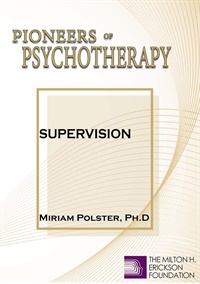
- Average Rating:
- Not yet rated
- Topic Areas:
- Psychotherapy | Dialogues | Group Psychotherapy
- Categories:
- Evolution of Psychotherapy | Evolution of Psychotherapy 2000
- Faculty:
- Miriam Polster | Irvin Yalom, PhD
- Duration:
- 58 Minutes
- Format:
- Audio Only
- Original Program Date:
- May 28, 2000
- Short Description:
- EP00 Dialogue 09 - Group Psychotherapy - Miriam Polster, Ph.D., and Irvin Yalom, M.D. Given a topic, to become aware of the differing approaches to psychotherapy, and to identify the strengths and weaknesses in each approach. Featuring Miriam Polster, Ph.D., and Irvin Yalom, M.D., moderated by W. Michael Munion, M.A.
- Price:
- $15.00 - Base Price

- Average Rating:
- Not yet rated
- Topic Areas:
- Conversation Hours | Psychotherapy
- Categories:
- Evolution of Psychotherapy | Evolution of Psychotherapy 2000
- Faculty:
- Miriam Polster
- Duration:
- 58:56
- Format:
- Audio Only
- Original Program Date:
- May 28, 2000
- Short Description:
- EP00 Conversation Hour 13 - Miriam Polster, PhD
- Price:
- $15.00 - Base Price
Tags: Miriam Polster Psychotherapy

- Average Rating:
- Not yet rated
- Topic Areas:
- Topical Panels | Goals of the Therapist | Therapist Development
- Categories:
- Evolution of Psychotherapy | Evolution of Psychotherapy 2000
- Faculty:
- Bert Hellinger, MA, Dipl. Psych | James Hillman, PhD | Arnold Lazarus, Ph.D. | Miriam Polster
- Duration:
- 57 Minutes
- Format:
- Audio Only
- Original Program Date:
- May 27, 2000
- Short Description:
- Topical Panel 10 from the Evolution of Psychotherapy 2000 - The Goal of Therapy Featuring Bert Hellinger, MA, Dipl. Psych., James Hillman, PhD, Arnold Lazarus, PhD, and Miriam Polster, PhD. Moderated by Brent Geary, PhD.
- Price:
- $15.00 - Base Price

- Average Rating:
- Not yet rated
- Topic Areas:
- Supervision Panels | Psychotherapy | Supervision
- Categories:
- Evolution of Psychotherapy | Evolution of Psychotherapy 2000
- Faculty:
- Mary Goulding, MSW | John Gottman, PhD | Miriam Polster
- Duration:
- 59:38
- Format:
- Audio Only
- Original Program Date:
- May 27, 2000
- Short Description:
- Supervision Panel 6 from the Evolution of Psychotherapy 2000 Featuring Mary Goulding, MSW, John Gottman, PhD, and Miriam Polster, PhD. Moderated by Brent Geary, PhD.
- Price:
- $15.00 - Base Price

- Average Rating:
- Not yet rated
- Topic Areas:
- Clinical Demonstrations | Eating Disorders | Gestalt | Suicide | Psychotherapy | Supervision
- Bundle(s):
- Women Pioneers of Psychotherapy | Pioneers of Psychotherapy Bundle
- Categories:
- Pioneers of Psychotherapy | Evolution of Psychotherapy | Evolution of Psychotherapy 2000
- Faculty:
- Miriam Polster
- Course Levels:
- Master Degree or Higher in Health-Related Field
- Duration:
- 01:01:00
- Format:
- Audio and Video
- Original Program Date:
- May 26, 2000
- Short Description:
- Miriam Polster (2000) demonstrates supervision with Wendy, a clinical social worker who conducts therapy in the home. Polster’s supervision focuses on finding Wendy’s unique gifts and how these can be integrated into therapy. Next, Steve is working with a woman who has a history of bulimia and has threatened suicide. Polster follows this demonstration by explaining her work.
- Price:
-
Nate Sub 1.1 Price is $0.00
price reduced from Base Price - $59.00

- Average Rating:
- Not yet rated
- Topic Areas:
- Invited Addresses | Gestalt | Psychotherapy
- Categories:
- Evolution of Psychotherapy | Evolution of Psychotherapy 2000
- Faculty:
- Miriam Polster | Paul Watzlawick, PhD
- Duration:
- 1 Hour 21 Minutes
- Format:
- Audio Only
- Original Program Date:
- May 25, 2000
- Short Description:
- This address will focus on some of the particulars of therapeutic attention. It will explore how to translate therapy into an increased sense of self-support and choice.
- Price:
- $15.00 - Base Price

- Average Rating:
- Not yet rated
- Topic Areas:
- Invited Addresses | Gestalt | Group Therapy | Psychotherapy | Group Psychotherapy
- Categories:
- Evolution of Psychotherapy | Evolution of Psychotherapy 1995
- Faculty:
- Miriam Polster | Alexander Lowen, MD
- Duration:
- 1 Hour 22 Minutes
- Format:
- Audio Only
- Original Program Date:
- Dec 17, 1995
- Short Description:
- The proliferation of therapeutic groups, either self-help or professionally staffed, has dramatically expanded the applicability of psychotherapy. This development reflects society's increased willingness to deal communally with personal problems that were previously restricted to private psychotherapeutic sessions. Gestalt group therapy, with its original emphasis on the freshness and pungency of individual experience has also extended its perspective to group work. Dr. Miriam Polster describes how the gestalt approach enlivens group focus and interaction through its principles of awareness and experiment-and especially through its attention to the quality of the contact between group members.
- Price:
- $15.00 - Base Price

- Average Rating:
- Not yet rated
- Topic Areas:
- Dialogues | Psychotherapy
- Categories:
- Evolution of Psychotherapy | Evolution of Psychotherapy 1995
- Faculty:
- Miriam Polster | Jeffrey Zeig, PhD
- Duration:
- 1 Hour
- Format:
- Audio Only
- Original Program Date:
- Dec 16, 1995
- Short Description:
- Dialogue 11 from the Evolution of Psychotherapy 1995 - Heroism, featuring Miriam Polster, PhD; and Jeffrey K Zeig, PhD.
- Price:
- $15.00 - Base Price

- Average Rating:
- Not yet rated
- Topic Areas:
- Conversation Hours | Psychotherapy
- Categories:
- Evolution of Psychotherapy | Evolution of Psychotherapy 1995
- Faculty:
- Erving Polster, PhD | Miriam Polster
- Duration:
- 58 Minutes
- Format:
- Audio Only
- Original Program Date:
- Dec 15, 1995
- Short Description:
- Conversation Hour 03 from the Evolution of Psychotherapy 1995 - Erving Polster, PhD, and Miriam Polster, PhD
- Price:
- $15.00 - Base Price

- Average Rating:
- Not yet rated
- Topic Areas:
- Clinical Demonstrations | Gestalt | Supervision
- Categories:
- Evolution of Psychotherapy | Evolution of Psychotherapy 1995
- Faculty:
- Miriam Polster
- Duration:
- 56 Minutes
- Format:
- Audio Only
- Original Program Date:
- Dec 15, 1995
- Short Description:
- Clinical Demonstration 09 from the Evolution of Psychotherapy 1995 - Supervision in Gestalt Therapy, featuring Miriam Polster, PhD. Educational Objectives: To demonstrate how gestalt therapy principles may apply in a supervision session. To explore how the characteristics of the supervisee may influence and enrich his/her therapeutic style.
- Price:
- $15.00 - Base Price

- Average Rating:
- Not yet rated
- Topic Areas:
- Supervision Panels | Supervision | Psychotherapy
- Categories:
- Evolution of Psychotherapy | Evolution of Psychotherapy 1995
- Faculty:
- Arnold Lazarus, Ph.D. | Miriam Polster | Margaret Singer, PhD
- Duration:
- 58 Minutes
- Format:
- Audio Only
- Original Program Date:
- Dec 15, 1995
- Short Description:
- A panel of experts discuss their viewpoints on the given topic.
- Price:
- $15.00 - Base Price

- Average Rating:
- Not yet rated
- Topic Areas:
- Workshops | Psychotherapy | Therapist Development
- Categories:
- Evolution of Psychotherapy | Evolution of Psychotherapy 1995
- Faculty:
- Miriam Polster
- Duration:
- 2 Hours 47 Minutes
- Format:
- Audio Only
- Original Program Date:
- Dec 14, 1995
- Short Description:
- We will address the diversity of awareness in therapy and explore how to use this as an entry and support for therapeutic movement.
- Price:
- $15.00 - Base Price

- Average Rating:
- Not yet rated
- Topic Areas:
- Conversation Hours | Psychotherapy
- Categories:
- Evolution of Psychotherapy | Evolution of Psychotherapy 1990
- Faculty:
- Miriam Polster | Erving Polster, PhD
- Duration:
- 58 Minutes
- Format:
- Audio Only
- Original Program Date:
- Dec 15, 1990
- Short Description:
- Conversation Hour 16 from the Evolution of Psychotherapy 1990, featuring Erving Polster, PhD, and Miriam Polster, PhD.
- Price:
- $15.00 - Base Price

- Average Rating:
- Not yet rated
- Topic Areas:
- Dialogues | Sex and Sexuality | Couples Therapy | Psychotherapy
- Categories:
- Evolution of Psychotherapy | Evolution of Psychotherapy 1990
- Faculty:
- Helen Singer Kaplan, MD, PhD | Miriam Polster
- Duration:
- 53 Minutes
- Format:
- Audio Only
- Original Program Date:
- Dec 14, 1990
- Short Description:
- Dialogue 04 from the Evolution of Psychotherapy 1990 - Sex Roles / Sex Rules, featuring Helen Singer Kaplan, MD, PhD, and Miriam Polster, PhD. Moderated by Ellyn Bader, PhD.
- Price:
- $15.00 - Base Price
- Average Rating:
- Not yet rated
- Topic Areas:
- Clinical Presentations | Supervision | Gestalt | Psychotherapy
- Categories:
- Evolution of Psychotherapy | Evolution of Psychotherapy 1990
- Faculty:
- Miriam Polster
- Course Levels:
- Master Degree or Higher in Health-Related Field
- Duration:
- 54:38
- Format:
- Audio and Video
- Original Program Date:
- Dec 14, 1990
- Short Description:
- Educational Objectives: To demonstrate how gestalt therapy principles may apply in a supervision session. To explore how the characteristics of the supervisee may influence and enrich his/her therapeutic style.
- Price:
-
Sale is $29.00
price reduced from Base Price - $59.00

- Average Rating:
- Not yet rated
- Topic Areas:
- Workshops | Gestalt | Psychotherapy
- Categories:
- Evolution of Psychotherapy | Evolution of Psychotherapy 1990
- Faculty:
- Miriam Polster
- Duration:
- 2:28:03
- Format:
- Audio Only
- Original Program Date:
- Dec 13, 1990
- Short Description:
- This workshop will demonstrate how the discoveries made in a psychotherapy session can be integrated into the everyday life of the patient through the changing balance between environmental support and self-support.
- Price:
- $15.00 - Base Price

- Average Rating:
- Not yet rated
- Topic Areas:
- Supervision Panels | Supervision | Psychotherapy
- Categories:
- Evolution of Psychotherapy | Evolution of Psychotherapy 1990
- Faculty:
- William Glasser, MD | Miriam Polster | James F. Masterson, MD
- Duration:
- 54 Minutes
- Format:
- Audio Only
- Original Program Date:
- Dec 12, 1990
- Short Description:
- Supervision Panel 01 from the Evolution of Psychotherapy 1990 - Featuring Glasser, Polster and Masterson Moderated by W Michael Munion, MA
- Price:
- $15.00 - Base Price

- Average Rating:
- Not yet rated
- Topic Areas:
- Conversation Hours | Psychotherapy
- Categories:
- Evolution of Psychotherapy | Evolution of Psychotherapy 1985
- Faculty:
- Erving Polster, PhD | Miriam Polster
- Duration:
- 50 Minutes
- Format:
- Audio Only
- Original Program Date:
- Dec 14, 1985
- Short Description:
- Conversation Hour 15 featuring Erving Polster, PhD, with Miriam Polster, PhD.
- Price:
- $15.00 - Base Price

- Average Rating:
- Not yet rated
- Topic Areas:
- Clinical Presentations | Gestalt | Supervision | Psychotherapy
- Categories:
- Evolution of Psychotherapy | Evolution of Psychotherapy 1985
- Faculty:
- Miriam Polster
- Duration:
- 51 Minutes
- Format:
- Audio Only
- Original Program Date:
- Dec 14, 1985
- Short Description:
- Educational Objectives: To know appropriate application of commonly accepted "gestalt" techniques To know the basic philosophy of gestalt psychotherapeutic interaction
- Price:
- $15.00 - Base Price

- Average Rating:
- Not yet rated
- Topic Areas:
- Invited Addresses | Gestalt | Psychotherapy
- Categories:
- Evolution of Psychotherapy | Evolution of Psychotherapy 1985
- Faculty:
- Miriam Polster | Robert L. Goulding, MD
- Duration:
- 1 Hour 11 Minutes
- Format:
- Audio Only
- Original Program Date:
- Dec 14, 1985
- Short Description:
- Invited Address Session 11 - Part 1 - Gestalt Therapy: Evolution and Application featuring Miriam Polster, PhD. With discussant Robert L Goulding, MD. Moderated by F Theodore Reid, Jr, MD.
- Price:
- $15.00 - Base Price

- Average Rating:
- Not yet rated
- Topic Areas:
- Workshops | Gestalt | Therapist Development | Psychotherapy
- Categories:
- Evolution of Psychotherapy | Evolution of Psychotherapy 1985
- Faculty:
- Miriam Polster
- Duration:
- 1 Hour 32 Minutes
- Format:
- Audio Only
- Original Program Date:
- Dec 13, 1985
- Short Description:
- Change in psychotherapy is a gradual process with predictable stages which can be understood and prepared for. Integrating new perspectives and behaviors requires attention to the needs of each of three phases: support, accommodation, and assimilation. These stages will be defined and demonstrated in work with volunteer workshop participants.
- Price:
- $15.00 - Base Price
- Average Rating:
- Not yet rated
- Topic Areas:
- Topical Panels | Psychotherapy
- Categories:
- Evolution of Psychotherapy | Evolution of Psychotherapy 1985
- Faculty:
- Miriam Polster | Erving Polster, PhD | Carl Rogers, PhD | Ernest Rossi, PhD
- Course Levels:
- Master Degree or Higher in Health-Related Field
- Duration:
- 1:02:51
- Format:
- Audio and Video
- Original Program Date:
- Dec 12, 1985
- Short Description:
- Topical Panel 08 on the Language of Human Facilitation, featuring Erving Polster, PhD, Miriam Polster, PhD, Carl R Rogers, PhD, and Ernest L Rossi, PhD. Moderated by Aaron H Canter, PhD.
- Price:
-
Sale is $29.00
price reduced from Base Price - $59.00



